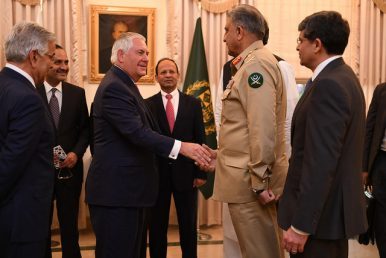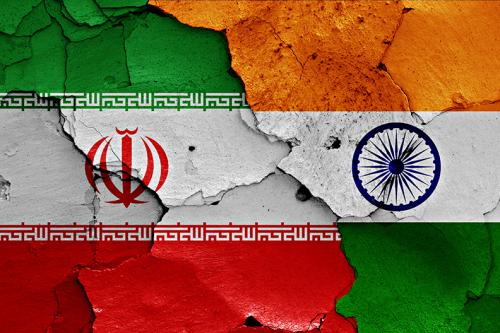Dr. Zafar Nawaz Jaspal |
TRUMP Administration announced its National Security Strategy (NSS) on December 18, 2017. It is aimed at promoting a balance of power that favours the United States, its allies and its partners. It underscored that: “China and Russia challenge American power, influence and interests, attempting to erode American security and prosperity.” Indeed, Pakistan is not interested in eroding American security and prosperity, but is committed in broadening the horizon of its strategic partnership with China. Simultaneously, it is endeavoring to improve its bilateral relations with Russia.
The NSS reiterated Washington’s commitment to enhance India’s role in the Asian strategic setting. It spelled out: “We will deepen our strategic partnership with India and support its leadership role in Indian Ocean security and throughout the broader region.” Admittedly, the primary objective of Indo-US strategic partnership is to check the increasing influence of China in the region, yet India’s military buildup undermines Pakistan’s security.
Trump Administration accused Islamabad for providing safe haven to Afghan Taliban. Americans scapegoating Pakistan to conceal their failure in Afghanistan is a hostile act.
Therefore, Islamabad cannot be apathetic to India’s increasing military potential and role in its neighborhood. Islamabad’s renunciation of Washington’s attempt to demonstrate India, as a Great Power, in South Asia is a source of annoyance for the Trump Administration. Therefore, President Trump and his cohorts are accusing and reprimanding Pakistan. Precisely, the NSS also echoed the displeasure of Trump Administration against Pakistan. Pakistan’s nuclear weapons are imperative for its sovereign defense.
Read more: United against terrorism
They are the foundation of Pakistan’s defense strategy to deter India’s aggression. The development of indigenous nuclear weapons not only solidify Pakistan’s defensive fence, but also decreases its dependency on the foreign military hardware. Decreasing dependency on the external military hardware suppliers, especially United States, had quashed Pakistan’s bandwagon policy. It gives confidence to the policy makers to chalk out independent foreign policy.
Since the beginning, the Americans have been trying to cap and roll back Pakistan’s nuclear weapon program. On December 18, 2017, once again the current NSS exhibited disbelief over the safety and security of Pakistan’s nuclear arsenal. The NSS demanded from Islamabad to continue demonstrating that it is a responsible steward of its nuclear assets. The NSS aimed to “encourage Pakistan to continue demonstrating that it is a responsible steward of its nuclear assets.”
Its mighty military machine has failed to secure unconditional victory in Afghanistan. The continuous Afghan Taliban resistance in Afghanistan is having frustrating impact on the Americans.
The history of Pakistan’s nuclear program proves that it is a responsible nuclear weapon state. Islamabad cannot compromise on its nuclear weapons because they are essential to prevent nuclear attack, non-nuclear strategic attacks, and large-scale conventional aggression. Hence, it always steward its nuclear assets responsible. The NSS correctly concluded that the Indo-Pakistani military conflict could lead to a nuclear exchange.”
However, it failed to express its concerns over the reckless behavior of the Indian ruling elite. Indian Prime Minister Modi and Air Force Chief had openly expressed their desire to conduct surgical strikes or hot pursuit against nuclear-armed Pakistan. This hawkish irrational arrogance of the Indian leadership is alarming for the South Asian strategic stability. The Trump administration’s NSS, however, has deliberately ignored New Delhi’s irresponsible surgical strike mania.
The NSS completely ignored Pakistan’s sacrifices in the global war on terrorism. It repeated old mantra of allegations and demands. “The United States continues to face threats from transnational terrorists and militants operating from within Pakistan.” It demanded, “Pakistan take decisive action against militant and terrorist groups operating from its soil.” In reality, the NSS echoed the Indians point of view: “cross-border terrorism that raises the prospect of military and nuclear tensions.”
Read more: Trump pressurizing East Asia to accept US policies in region?
On December 18, 2017, retired Lt Gen Nasser Khan Janjua, Prime Minister’s special adviser on national security categorically stated that the United States is “speaking India’s language.” He added: “The US is willing to give India a bigger role in Afghanistan while blaming Pakistan for its own failure in the region.” The blunt response of the General Janjua manifests Islamabad unwillingness to submit to the illogical demands of the Trump Administration.
The NSS demanded from Islamabad to continue demonstrating that it is a responsible steward of its nuclear assets. The NSS aimed to “encourage Pakistan to continue demonstrating that it is a responsible steward of its nuclear assets.”
Realistically, today, America’s military remains the strongest in the world. Despite it, the military advantages of the United States are shrinking or limits are exposed in the prevalent global politics. Its mighty military machine has failed to secure unconditional victory in Afghanistan. The continuous Afghan Taliban resistance in Afghanistan is having frustrating impact on the Americans.
On August 21, 2017, President Trump in his South Asian plan highlighted Americans frustrations. He stated: “I share the American people’s frustration. I also share their frustration over a foreign policy that has spent too much time, energy, money — and most importantly, lives — trying to rebuild countries in our own image instead of pursuing our security interests above all other considerations.”
Read more: Pakistan-US ties: A reality check
At various occasions, Trump Administration accused Islamabad for providing safe haven to Afghan Taliban. Americans scapegoating Pakistan to conceal their failure in Afghanistan is a hostile act. To conclude, preceding discussion marks that Islamabad and Washington are drifted apart. Thus, the Pakistani ruling ought to be vigilant and pragmatic in dealing with the Americans.
Dr. Zafar Nawaz Jaspal is Associate Professor, School of Politics and International Relations, Quaid-i-Azam University, Islamabad. He is also an advisor on Non-Proliferation to SASSI, London and a course coordinator at Foreign Services Academy for the Pakistan Ministry of Foreign Affairs. Email: jaspal_99@hotmail.com. This piece was first published in Pakistan Observer. It has been reprinted with permission. The views expressed in this article are the author’s own and do not necessarily reflect Global Village Space’s editorial policy.














